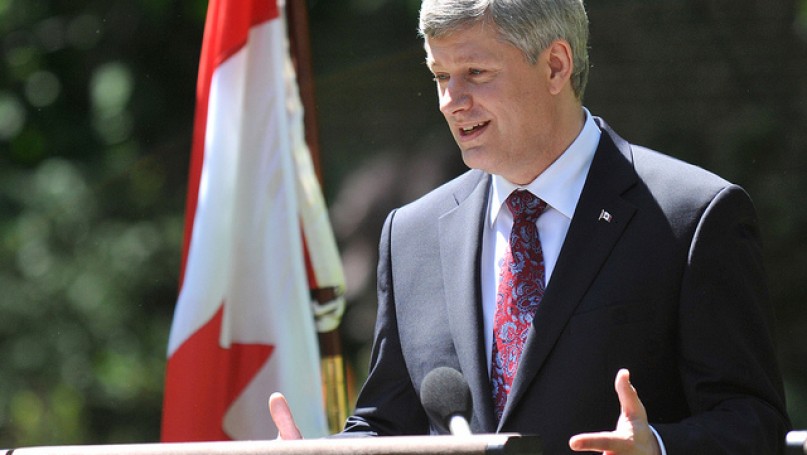
Among the most prominent debates in Canadian foreign policy is current Prime Minster Stephen Harper’s attitude toward multilateral institutions. Since first taking office in a minority government situation in 2006, Harper has been accused of doing significant harm to Canada’s reputation on the international stage because of his withdrawal and, according to his critics, open contempt for multilateralism.
This concept has incredible relevance in Canada, primarily because of how Canadians see the country’s role on the global stage. In a recently published article in International Journal, Roland Paris makes a convincing argument, based on both quantitative and qualitative methodologies, to demonstrate that Canadians still identify strongly with the ideas and norms of liberal internationalism. Paris argues, “This finding is striking because the Harper government has not only eschewed many practices and policies of liberal internationalism, but has apparently also sought to discredit the idea of liberal internationalism in the minds of Canadians, replacing it with a different narrative about Canada’s role in the world.”
Paris is correct to note that the tone and substance of Canadian foreign policy under Harper has changed, and much of that change has to do with Canada’s engagement with multilateral institutions. Harper’s focus diverges in many ways from the historical orientation of Canadian foreign policy, as he seems primarily interested with arrangements that will lead to economic benefit or those that involve countries of similar value-sets. As the Leader of the Opposition prior to his becoming Prime Minister, Harper was openly critical of the UN and other institutions he felt Canada should have little role in.
In an effort to defend Harper, his former Chief of Staff Ian Brodie, now the Director of Research at the University of Calgary’s School of Public Policy, claims that Harper is in fact still an internationalist, just of a different slant. “What kind of internationalist is Harper? Appropriate in his multilateralism, given the challenges at hand. Consistent with some Canadian traditions on maternal health. Showing no reluctance to deploy military forces overseas. Ready to stand for democratic allies and oppose terrorist organizations. And reluctant to embrace the honest broker role when vital principles are at stake. Roland Paris is right – this adds up to an important new role for Canada in the world. And a better one.”
Both arguments are valid, but in some ways, both miss the point.
It is one thing to note that a government has withdrawn from multilateral engagement, or that a leader’s approach to multilateralism is more “appropriate”, but the main question here is why do states engage with multilateral institutions at all?
States like Canada have no choice but to take part in multilateral institutions, as our capabilities and power are relatively limited. Much of the international relations scholarship surrounding the idea of middle powers and strategies employed by lesser states used Canada as a prime example of how hard power-limited states can maximize their relative power position in the world by bandwagoning with more powerful allies and joining as many institutions as possible to expand its sphere of influence. Institutions, especially throughout the years of the Cold War, provided Canada with the perfect opportunity to say whatever it wanted without the expectation or burden of having to enforce its rhetoric on its own.
What is often missed in these debates about multilateral engagement is that multilateralism is only one part of a foreign policy strategy aimed at maximizing a state’s security. So yes, Canada’s current approach to institutions like the UN is different than it was a decade ago or three decades ago – and rightfully so. Strategies and interests evolve as the nature of the international system changes, and status quo strategies are unlikely to yield optimal outcomes.
Where I agree with Paris to a point is that, while I have no issue with Harper changing Canada’s approach to institutions, I am not yet convinced the changes are as beneficial as Brodie makes them out to be.
As the system transitions from unipolarity to multipolarity, multilateral institutions will be more important than ever for Canada. Multipolarity, as IR theory teaches us, is the least stable structure of the system and has the highest likelihood of conflict, and in such an environment, it only makes sense for a middle power like Canada to entrench itself in institutions that can provide benefit at little cost. The UN has lost its way in the last two decades, but it is irrational for Canada to distance itself from an institution that provides far more advantage than anything else. There is no obligation for Canada to take part in every mission or commit to every cause under an institution’s umbrella, so why not show up and articulate a position as forcefully as possible if the issue truly is one of principle?
In conclusion, there are two key points here: one, that state strategies must evolve as the landscape of international politics evolves, and that includes how state approach multilateral institutions; and two, it makes little logical sense for a state like Canada to withdraw from institutions or arrangements that add more benefit than incur costs. Every state must calculate a foreign policy designed to maximize security and pursue national interests, and Canada is no different. While Canada has evolved, its evolution may not lead to the desired outcomes.
Further Reading on E-International Relations
- The Doctrine of Residual Power in Canadian Diplomacy
- Opinion – Multilateralism as Panacea for COVID-19
- Opinion – Can the Coronavirus Crisis Revive Multilateralism?
- Opinion – Multilateralism’s Collapse Under Trump and the Call for Global South Pluriverse
- Brazil’s Multilateral Trajectory and the Challenges the Crisis of Multilateralism Poses to the Global South
- Broken Threads: Reshaping Multilateralism with COVID-19 under Way